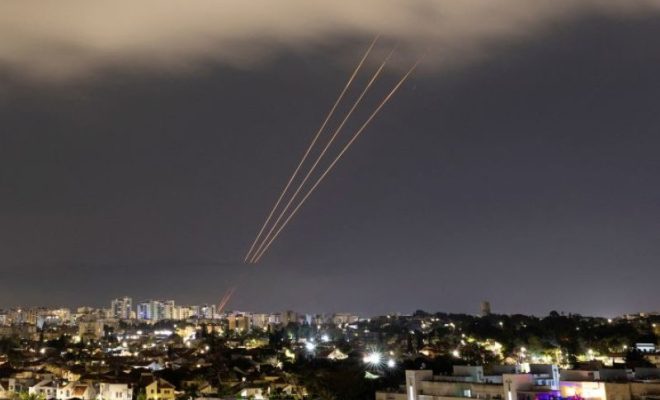Israel on High Alert as it Weighs Response to Iranian Attack

Israel on High Alert – is carefully considering its options in response to the unprecedented Iranian missile and drone assault on its territory. While the country’s forces remain on high alert, the Israeli government has signalled that it will not immediately act unilaterally. Two members of the three-man war cabinet have hinted at a more measured, longer-term approach to retaliating against Iran’s first direct attack on Israeli soil. However, Prime Minister Benjamin Netanyahu has yet to formally announce Israel’s decision on how to proceed.
Potentially Catastrophic Attack Thwarted – Israel on High Alert
US officials have assessed that the Iranian salvo, which included over 100 ballistic missiles, could have been catastrophically destructive had they not been intercepted by Israel’s defences. The sheer scale and power of the Iranian assault raised the very real prospect of sparking a much broader regional war. The successful interception by Israel, with the aid of its allies, is seen as a significant victory that has averted an even more dire scenario.
Opportunity for a New Strategic Alliance
The Israeli Defense Minister, Yoav Gallant, framed the successful defence against the Iranian attack as an opportunity to build a new “strategic alliance” against Iran. This sentiment was echoed by Benny Gantz, a member of Israel’s wartime unity government, who stated that Israel would “build a regional coalition and exact the price from Iran” in a manner and timing of its choosing. The attack appears to have galvanized Israel and its allies against the common threat posed by Iran.
Israel Keeping Options Open
Despite the statements from some Israeli leaders suggesting a more measured response, the country’s chief military spokesperson, R Adm Daniel Hagari, made clear that Israel is keeping its options open. Hagari revealed that Israel’s leadership had approved operational plans for both offensive and defensive actions in the hours following the Iranian assault. This indicates that Israel is prepared to act militarily if it deems necessary, while also potentially pursuing other non-kinetic options.
US Prioritizes De-escalation, Not Participation in Counter-Offensive
The Biden administration has sought to dissuade Israel from immediately launching a counter-offensive against Iran. US officials have argued that the successful defence of Israel, aided by American and other allied support, represents a victory in itself, demonstrating the clear military superiority of Israel and its partners. The US has made it clear that it would not participate in any Israeli retaliation against Iran, prioritizing the de-escalation of tensions and containment of the crisis in the region.
UN Warns of Middle East Brink
Addressing the United Nations Security Council, UN Secretary-General António Guterres condemned the Iranian attack as a “serious escalation” and warned that “The Middle East is on the brink.” This stark assessment underscores the gravity of the situation and the potential for further destabilisation and conflict in the region if tensions are not carefully managed.
Also Read | Japan’s Prime Minister Urges U.S. Support for Ukraine
Iran Warns of Larger Retaliation
Iran has sought to signal its determination to respond to any Israeli retaliation. Moreover, the Iranian Army Chief of Staff threatened that Iran’s response would be “much larger” if Israel retaliated, while also warning that any US support for Israel would result in American military assets in the region being targeted.
Calls for Restraint Across the Region
Amid the rising tensions, various regional powers, including Russia, China, Turkey, Egypt, Qatar, and the United Arab Emirates, have urged both sides to exercise restraint. During a visit to China, German Chancellor Olaf Scholz stated “We will do everything to stop a further escalation” and cautioned Iran against “continuing this way.” These calls for de-escalation underscore the widespread concern about the potential for the conflict to spiral out of control.



